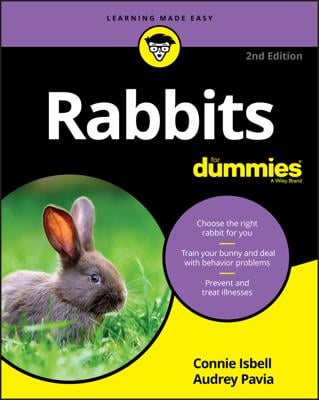A hutch is essentially a cage, often made of a wood frame and enclosed in wire mesh. Hutches usually stand on tall legs, although some are legless and can be placed on top of a table or other surface, or kept on the ground in milder climates.
You can buy an outdoor hutch for your rabbit or make one yourself. The choice is yours. Whichever route you take, be sure to provide your rabbit with the largest possible hutch that you can afford.
Knowing what to look for when buying
Luckily for rabbit owners, commercially made rabbit hutches are readily available in pet supply stores, feed stores, catalogs, and on the Internet. They range in price from under $100 to several hundred.Hutch styles vary considerably, and a design exists for just about every taste. Some look like big wooden boxes, but others resemble log cabins. Some have attached exercise runs (a great idea) while others have nest boxes built in. The hutch you ultimately choose depends a great deal on what you can afford, what you have room for, and what you think your rabbit can enjoy the most.
Aside from these considerations, you also need to ruminate on several other points.
- Protection from weather: The hutch you buy has to protect your rabbit from heat, cold, and dampness. So the hutch needs a waterproof covering and a well-crafted nest box, if one comes as part of the design. It also needs good ventilation that can prevent hot air from becoming trapped inside the hutch where it can kill the rabbit.
- Protection from chewing: To keep your rabbit from gnawing away at the wood portions of your hutch, purchase or make one that has wire over the exposed wood sections.
- Flooring: While an outdoor hutch requires a metal mesh floor to allow the rabbit's droppings to fall through, you'll also need a portion of the floor to be a solid material. Rabbits who stand exclusively on wire day in and day out develop sore hocks and possible infections as a result. Make sure at least a third of the hutch floor is solid material, preferably not metal, which is poorly insulated from heat or cold. A wood floor safely treated to keep out moisture or covered with a no-wax flooring is preferable.
- Overall quality: Just like with any other product, quality varies in outdoor rabbit hutches. When shopping for a hutch, look for quality workmanship and materials. If you're able to examine the hutch in person before buying it, check to make sure it's sturdy, and that the wire and wood are n't flimsy and poorly finished.
Understanding why size matters
The size of the hutch you buy depends on several factors, the least of which is cost. The bigger the hutch, the pricier it will be. However, keep in mind that your outdoor rabbit can spend most of his time inside this hutch, so the bigger the hutch, the better for your rabbit.In terms of a minimum size, you should use the following equation:
1 pound of rabbit = 1 square foot of space
A typical rabbit weighs around 6 pounds, and therefore needs about 6 square feet of hutch space (2 by 3 feet). Also, keep in mind that if you're buying a hutch for a baby rabbit, you should estimate how large your pet can grow up to be and do the math according to his full-grown size. Of course, this is the absolute minimum. Your rabbit is much happier with even more space to call his own, and here's why:- Rabbits who don't have enough space to move around often become bored.
- The less room a rabbit has for his living quarters, the less a rabbit exercises in general, the greater his chance is for obesity.
- Small spaces are quickly fouled with urine and feces, which creates an unhealthy environment for the rabbit.
If you intend to house more than one rabbit, you obviously need a bigger hutch. Double the one pound of rabbit per one square foot, using the combined weight of your rabbits. Make sure that your nest box is big enough to hold more than one rabbit, too. You should provide at least two hide areas; one can be larger and heated, but another can function as an escape if needed.
Looking at design
In addition to size, you need to consider rabbit hutch design when determining your purchase. This is not just for aesthetic reasons but also for practical reasons, too.Consider the following:
- Height: Rabbit hutches come in different heights, from short dwellings that lie close to the ground, to tall cages that require little bending when cleaning them or placing a rabbit in the cage or taking one out. Hutches low to the ground can be unhealthy for rabbits in the wintertime because cold air and dampness settles closer to the ground in climates with cold winters. In climates with mild winters, cages near the ground or on the ground are fine. (Rabbits prefer to be on the ground and the effect of having them elevated in a hutch is unknown. It may be stressful for them, but it's hard to evaluate.)
- Ease of cleaning: You'll have to thoroughly clean your rabbit's hutch on a weekly basis. Some hutches are easier to clean as a result of their design. Look for a hutch design that allows easy access with more than one opening. The positioning of the doors should permit you to reach all parts of the hutch.
- Rabbit security: Hutches with secure hiding places that allow rabbits to hide from predators and feel like they're unreachable within the hutch are best for your bunny's well being. Opt for one of these hutches if it's within your price range. If not, give your rabbit several nest boxes to use for hiding places.

